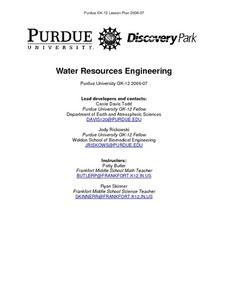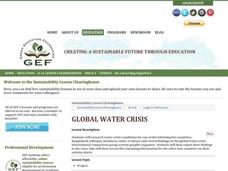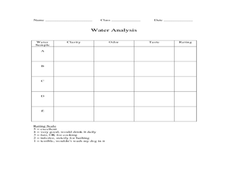Nuffield Foundation
Investigating Enzymes Used in Laundry Detergent
It's a win-win situation: learn about enzymes and get clean clothes, too. Young scientists add enzymes to a dilution of laundry detergent. They apply them to stained fabrics to determine the effectiveness of the enzyme-filled detergents.
Sunburst Visual Media
Clouds
Support science instruction with a combination of engaging activities and skills-based worksheets that focus on clouds. Learners take part in grand discussions, write an acrostic poem, complete graphic organizers, solve word...
Royal Society of Chemistry
pH 4: Activity
Sometimes playing games in class isn't a bad thing. Science sleuths evaluate and calculate pH and pOH with an online resource. They then manipulate concentration information and relate it during a series of puzzles.
College Board
2002 AP® Environmental Science Free-Response Questions
Are electric motors all they're cracked up to be? Scholars take a stance and use their knowledge to discuss the benefits and disadvantages of the motor as the first question in a series of four. The questions that follow ask about other...
PBS
Phase Changes | Phases of Matter | UNC-TV Science
Take an energetic ride through the phase changes of a water molecule in a compact activity. Young scientists learn about the phases of matter and discover the role of thermal energy in governing phase changes while watching a short...
Virginia Department of Education
Freshwater Food Chains
What's in the water? Encourage your class to further explore this question and learn about pond ecosystems, food chains, and food webs as they complete this hands-on activity. They view the environment from a new perspective...
University of Georgia
Endothermic and Exothermic Reactions
Equip your chemistry class with the tools to properly understand endothermic and exothermic reactions. Young chemists collect, analyze, and graph data to determine how the Law of Conservation of Matter is applied to chemical...
Virginia Department of Education
The Effects of Heat and Acid on the Enzyme Catalase
How quickly do enzymatic reactions occur? Assist the class as they examine heat and pH change to determine the rate of chemical reactions using catalase as an enzyme. Watch them "glow" with excitement!
Scholastic
Study Jams! Photosynthesis
One friend explains to another that plants combine water and carbon dioxide with the energy of the sun to produce sugar and oxygen. She mentions the roles of the roots, chloroplasts, and stomata in an engaging video that reviews how...
Curated OER
Properties of Water with a Splash of Color
Students explore the properties of water. In this cross curriculum art and physical science lesson, students experiment with a variety of materials to demonstrate the cohesive forces and adhesion of water. Students create a water color...
Curated OER
Water Resources Engineering
Learners illustrate the chemical differences between surface and tap-water. They investigate the common chemical and physical parameters relevant for water quality and gain hands on experience with water quality testing.
They enhance...
Curated OER
Global Water Crisis
Students research a given nation and complete an activity chart for that country. In this water crisis lesson students work in groups to organize and present the information for their given country.
Curated OER
The Preparation of Teraamminecopper(II) Sulphate-1-water
In this complex salt learning exercise, students create teraamminecopper(II)sulphate-1-water using copper(II)sulphate, concentrated ammonia and ethanol. Students determine the formula mass for their product, the theoretical yield of the...
Curated OER
Water Purification
Students use the example of natural water purification to show that healthy ecosystems provide services to people that are essential to life as we know it.
Michigan Sea Grant
Water Quality
Learners observe water samples and measure the samples' water quality. Students develop their own criteria for measuring water quality and test for temperature, acidity, oxygen levels, turbidity, conductance, sediment and hardness.
Curated OER
Water Group Creative Writing
In this water vocabulary worksheet, students collaborate with classmates to write a group story. Students have 25 minutes to write a brief story using the 15 words in the box.
Curated OER
Water and Ice
Learners observe and discuss what happens when water turns to ice and when ice turns into water. In this freezing and melting lesson plan, students observe ice and water and complete hands on activities that change their properties.
Curated OER
Global Water Crisis
Assign ecologists one of five countries that struggle with access to clean water. They research the water crisis in that country and then present information to classmates. A handout was designed for each country, and a worksheet on...
Curated OER
Water Pollution
Get your scientists engaged in both recall and life application responses after reading a selection from a McGraw Hill science text (not included). Based on chapter 14, this water pollution worksheet has students review where water...
Curated OER
Bottled Water vs. Tap Water
Students analyze the similarities and differences between tap water and bottled water. They make informed decisions about their use of each. Students are asked if they drink mostly tap water straight from the tap or water fountain. They...
Curated OER
Is Our Water Healthy?
High schoolers test water for a least one chemical characteristic. They hypothesize how a storm event might change the chemical characteristics of a stream. Students collect water samples and use the chemical test to test the water.
Curated OER
How Much Water is in That River?
Young scholars practice measurement using the Hudson River. They calculate the discharge measurement at a location on the Hudson River using ingenuity and a topographic map.
Curated OER
What happens to water before we use it?
Students examine how water is treated prior to becoming available for human consumption. In this water treatment activity, students conduct an experiment in which they filter water. Students formulate a hypothesis, test, analyze data,...
Curated OER
Water
Students conduct a series of investigations on the unique properties of water. In this general science activity, students explain what causes water's surface tension. They explain the different stages in the water cycle.

























